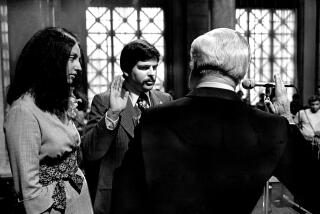Moscow’s First First Lady : I HOPE: Reminiscences and Reflections, <i> By Raisa Gorbachev translated by David Floyd (HarperCollins: $20; 224 pp.)</i>
- Share via
In a meeting with newspaper editors several weeks after the failed coup, Mikhail Gorbachev was asked about his wife Raisa. “She is a person with a lively imagination . . . capable not only of sympathizing but of analyzing. When I am asked, do you discuss all issues with your wife . . . I reply, ‘All issues.’ ”
Gorbachev was therefore surprised, he admitted, that she did not discuss everything with him: “I only recently learned that last year she was writing notes for a book.”
Raisa Gorbachev’s book, “I Hope,” however fragmentary and reticent, is unique. It is the first real memoir we have had by a wife of any Soviet leader. (Lenin’s wife, Nadezhda Krupskaya, published elliptical memoirs, but even they were heavily censored under Stalin.) Cast in the form of an extended interview with Soviet journalist Georgi Pryakhin, the book seeks to dispel what Mrs. Gorbachev calls the “inventions, myths and even slander” written about her.
All memoirs by political figures operate at varying degrees of candor. They seek, after all, to present the author in the best historical light. It is likely that Mrs. Gorbachev prepared “I Hope” under political restraints, if only because her husband is still in office. Readers expecting inside information on political struggles inside the Gorbachev leadership or a settling of scores with Nancy Reagan will be disappointed. And because the book was finished four months before the abortive coup, Mrs. Gorbachev has nothing to say about her harrowing experience of house arrest or her recovery from a mild stroke after returning to Moscow.
But the book can be read at another level and, as such, is surprisingly revealing. Raisa Gorbachev is most candid and emotional when she talks about her early years. One of three children in a poor family, she was born in a small Siberian town. Her father worked on the railroad, and the family moved like birds of passage from one town to the next. Mrs. Gorbachev reveals that she was christened in a Russian Orthodox priest’s house, that her maternal grandfather disappeared in Stalin’s purges of the late 1930s and that, as a result, her grandmother died of “grief and hunger.” Ambitious and smart, she won a scholarship to study philosophy at prestigious Moscow State University. There she fell in love with a young law student, Mikhail Gorbachev.
Although the rest of their story is generally known, the memoirs add interesting personal details about the Gorbachevs’ courtship and marriage, their early life together in Stavropol where he began his career as a provincial party official in the mid-1950s, and his subsequent rise through the Communist Party system. Mrs. Gorbachev recalls, for example, having so little money that she had to borrow shoes for her wedding. As impoverished newlyweds, the Gorbachevs’ first joint purchase was a tailor-made dress and, during their first years in Stavropol, they lived with their infant daughter Irina in a communal apartment--the kind of life still endured by millions of Soviet citizens today.
Although she is reticent about her husband’s political struggles inside the establishment, Mrs. Gorbachev is fiercely critical of the formalism and callousness of the Moscow Party elite in the late 1970s, when they returned to the capitol. She describes a Soviet political officialdom, strongly reminiscent of its czarist predecessor, in which people received only what is laid down according to your position on the hierarchical ladder, and not according to your real contribution to the country’s well-being. Alas, she continues, “the same system operates not only in Moscow but everywhere in the country.”
Mrs. Gorbachev emerges in her memoirs as a strong, independent, and engaging person. In a country dominated by conservative views on the role of women, these qualities aroused resentment and hostility toward her when Gorbachev, in a striking departure from tradition, brought her forward in 1985 as a Western-style First Lady. By keeping his wife at his side as he traveled abroad and at home, Gorbachev may have hoped to rally Soviet women--perhaps the most highly educated and underutilized segment of society--to play an active role in his epic effort to transform the Soviet system. But as his radical reforms began to generate political opposition and social resistance, Mrs. Gorbachev became a lightning rod for grievances against her husband’s policies. Hostile anecdotes about her stylish clothes and self-assertive behavior began to circulate in Moscow. While Americans may find nothing unusual in a First Lady having influence on her husband’s decision-making--a circumstance that, incidentally, Gorbachev has confirmed--it outraged many Soviet citizens. Attacks against her, Mrs. Gorbachev argues, reflect Soviet society’s “attitude toward women as a whole.”
“I Hope” is also an important document for future biographers of Gorbachev, arguably one of the major figures of the 20th Century. Mrs. Gorbachev, for example, provides some evidence that her husband, contrary to most Western scholarly opinion, may have already been a reformer in the Soviet system as early as 1953. While working in the Molotov Region Prosecutor’s office, Gorbachev wrote her: “I am so depressed by the situation here . . . especially the manner of life of the local bosses. The acceptance of convention, subordination . . . the contempt for science . . . such passivity and conservatism. . . . On another occasion, many years later, she recalls Gorbachev told a private family gathering that perestroika began in 1970 in Stavropol where he began “to put into practice quite a few ideas that had matured after long and painful debates.”
The biographies of Raisa and Mikhail Gorbachev illustrate three important characteristics of the generation that introduced, and presided over, perestroika. First, many of them rose from their origins in the peasant countryside to become educated members of the cultural and technical intelligentsia. Second, like millions of Soviet citizens the Gorbachevs came from families that were directly victimized by Stalin’s terror. (Nor, in this respect, was Gorbachev alone in the political leadership: Former Foreign Minister Eduard Shevardnadze, former Politburo member Yegor Ligachev and the new head of the KGB, Vadim Bakatin, all had relatives arrested and shot during the Stalin era.) Finally, Mrs. Gorbachev’s memoirs testify, they were the political offspring of the first effort to reform the Stalinist system under Nikita Khrushchev, and it is their so-called “sixties generation” that is still struggling to dismantle Stalin’s legacy.
Mrs. Gorbachev’s book is the first authentic memoir by a Soviet political wife but it is not likely to be the last. Several prominent Soviet political figures have already rushed hastily composed memoirs to Soviet and Western publishers. The most candid memoirs may come from the most unexpected sources--for example, Ligachev, the Politburo member who from 1985-89 was leader of the Communist Party’s conservative wing. Raisa Gorbachev’s memoirs certainly do not tell everything she knows about the extraordinary times and events she has witnessed, but it is a surprisingly interesting book by an exceptional woman.
BOOKMARK: For an excerpt from “I Hope: Reminiscences and Reflections,” see the Opinion section, Page 2.
More to Read
Sign up for our Book Club newsletter
Get the latest news, events and more from the Los Angeles Times Book Club, and help us get L.A. reading and talking.
You may occasionally receive promotional content from the Los Angeles Times.










